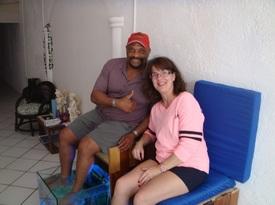Thoughts on therapy?

Sammers48220
Posts: 50 Member
Now that I have a surgery date, this is all becoming very real to me. I didn't really "dig in" on my supervised diet because more than a 10lb weight loss would've triggered an insurance denial.... at least that's what I'm telling myself. Maybe I wasn't ready to dig in quite yet.
At any rate, I've been reading a lot of weight loss blogs and forums, and I've wondered if anyone has any thoughts on going to a therapist, either pre or post WLS? I clearly haven't been a yo-yo dieter my whole life because I have a healthy relationship with food, so I don't see how it could hurt. It seems like a lot of successful people have good things to say about it.
Just curious if anyone here has personal experience with it.
At any rate, I've been reading a lot of weight loss blogs and forums, and I've wondered if anyone has any thoughts on going to a therapist, either pre or post WLS? I clearly haven't been a yo-yo dieter my whole life because I have a healthy relationship with food, so I don't see how it could hurt. It seems like a lot of successful people have good things to say about it.
Just curious if anyone here has personal experience with it.
0
Replies
-
I don't have personal experience with it but know people who do and it has helped them tremendously. Whether it be a therapist, on your own or with a support group, you need to work out your issues with food and find a healthy relationship. Best of luck
 0
0 -
I spent a year in therapy before I ever decided to have surgery and I continue to have therapy. I started off at 382 lbs, and I knew that wasn't normal. It was so helpful for me to sort out issues before surgery, and to get my head in a place where I knew I was really ready. Post surgery, therapy has been helping me adjust to a new me and a new normal. I have lost 208 lbs and that can mess with your head on so many levels lol. Give therapy a try and see if it's for you. Try support groups too, like Janet suggested. I still attend support group meetings and it's always a positive experience. Congrats on getting your surgery date!0
-
I spent a year in therapy before I ever decided to have surgery and I continue to have therapy. I started off at 382 lbs, and I knew that wasn't normal. It was so helpful for me to sort out issues before surgery, and to get my head in a place where I knew I was really ready. Post surgery, therapy has been helping me adjust to a new me and a new normal. I have lost 208 lbs and that can mess with your head on so many levels lol. Give therapy a try and see if it's for you. Try support groups too, like Janet suggested. I still attend support group meetings and it's always a positive experience. Congrats on getting your surgery date!
So glad to hear about your positive experience, and congrats on the weight loss, you look great!
0 -
My insurance and practice required approval from a mental health professional before they'd approve. She was helpful for me. I saw her three times preop, have an appointment one month postop, and she's there whenever needed.0
-
I find therapy to be another valuable tool in the process.0
-
I did some therapy pre op but not much happened-- honestly, I have done a lot of work in therapy in past years, so there was not much left to do.
 Still, I know some folks have found therapy very helpful in this process. 0
Still, I know some folks have found therapy very helpful in this process. 0 -
My plan also required a mental health professional referral. It did help to talk to someone one on one, but I read this book called Weight Loss Surgery: The real skinny and it helped me the most! It talks about the emotions, changes, limits of the surgery and weight management that preceded and follow surgery. It is a short read and I will probably read it again soon0
-
My insurance and practice required approval from a mental health professional before they'd approve. She was helpful for me. I saw her three times preop, have an appointment one month postop, and she's there whenever needed.
Same here. Had to take a psych exam and see a psych and be evaluated. Plus, my surgeon's office has in-house therapists for those that need them at any time. They also have support groups that meet monthly. I have yet to see a therapist since the mandatory visit nor have I visited the support group yet. Honestly, I think most of the things I have wondered about has been answered on here in one way or another. However, it is good to have a support system of some kind. Mine just happens to be here pretty much, but I do plan on eventually paying the support group a visit just to check it out. I think it could be beneficial if you need it.0 -
I started going to the monthly support groups and they are good, but feel so small (about 10-12 people) compared to the daily support group here.0
-
I had to do a pre-op exam with a psychologist and do an MMPI test. I personally didn't find the psych to be very helpful to me. I agree with the others, I have had lots of support and answers to questions here from people who have done this before me. But, I do get why some may benefit from the therapy. We all have reasons for why we overate but for some the reasons may have more of an effect on their lives than for others and if not overeating, could manifest themselves in other negative ways.0
-
I believe therapy can be an invaluable tool. But I have to share something funny. When I went into the pre-op psych evaluation, I was asked a bunch of questions, one of which was "Do you ever wake up and find large amounts of money in your possession and you have no idea how it got there?" My answer, "I WISH!!" made the psychiatrist who had not cracked a smile up until that time burst out laughing. Apparently, I still passed for "normal".

0 -
klcovington wrote: »I believe therapy can be an invaluable tool. But I have to share something funny. When I went into the pre-op psych evaluation, I was asked a bunch of questions, one of which was "Do you ever wake up and find large amounts of money in your possession and you have no idea how it got there?" My answer, "I WISH!!" made the psychiatrist who had not cracked a smile up until that time burst out laughing. Apparently, I still passed for "normal".

That made me laugh out loud! I wonder what the purpose of having that question on a psych exam could possibly be!0 -
Thank you everyone for sharing your thoughts! I, also, had to have a psych evaluation as part of my approval process. I was immediately cleared with no restrictions (which, she said, is pretty rare for their program). I do, however, have a couple of concerns that I don't think the basic eval addressed.
First, I'm concerned that a lot of my relationships and social life revolve around food - I'm young and single and a bartender, so a large part of my time is spent at restaurants and bars. I want to be really prepared for that to change and for the effect it might have on my relationships.
I'm also concerned about how I'm going to handle it when my "honeymoon" phase is over - when I'm not getting the high of seeing the scale constantly moving AND I need to handle maintaining my weight while being able to eat relatively normally again.
I think these forums are really helpful, but I can also see the value in talking to a therapist who can help me be proactive about the changes ahead.0 -
It is Definitely a challenge to modify behavior from being food-based to activity-based. That is something I am really trying to do. Before, so much of my socializing centered around food events (happy hour, lunches, dinner, etc.) It is hard not to drift back to that and I can really see how being young and single would be even more challenging! But I know that there are events for singles in our area (DC/Northern VA) where you can meet at zip line events, runs, and so forth so maybe you could try that. It definitely seems like fun and it isn't centered around food. Besides...you can really see a person's true personality when they are sweaty! ha ha0
-
Sammers48220 wrote: »I'm concerned that a lot of my relationships and social life revolve around food - I'm young and single and a bartender, so a large part of my time is spent at restaurants and bars. I want to be really prepared for that to change and for the effect it might have on my relationships.
Wow-- I can see why you would be concerned about that. My suggestion? THis journey has a set of challenges for each part-- pre op, early post op, later post op and maintenance. I have found it best to focus on the stage I am in--- navigating those challenges before I worry too much about what lies ahead. I am almost a year out and I have found the changes I made over time post op have now become incorporated into my life-- if you would have told me pre op I would be doing things like eating a spinach omelet for breakfast and getting up at 5am to work out I would have laughed til I fell off my chair-- and then been scared because I could not imagine living the way I do today without an overwhelming amount of work. The fact is that it is not overwhelming because I took each day as it came and gradually, things shifted. Sammers48220 wrote: »I'm also concerned about how I'm going to handle it when my "honeymoon" phase is over - when I'm not getting the high of seeing the scale constantly moving AND I need to handle maintaining my weight while being able to eat relatively normally again.
Sammers48220 wrote: »I'm also concerned about how I'm going to handle it when my "honeymoon" phase is over - when I'm not getting the high of seeing the scale constantly moving AND I need to handle maintaining my weight while being able to eat relatively normally again.
I think these forums are really helpful, but I can also see the value in talking to a therapist who can help me be proactive about the changes ahead.
The scale has slowed waaaayyyy down for me (I am losing maybe a half pound a week?)-- and I like how I look. So far, what has kept me from complacency is how fabulous I feel whne I exercise and eat in ways that nourish my body. I have TONS of energy and life is SO GOOD. I know when I eat less nutritive food (like high carb/sugary stuff) I feel like poo. Being mindful of how food will make me feel really helps keep me on track.
0 -
I think that therapy is a great idea. I had to go prior to my surgery, and it was a good experience. Talking things through with an impartial person is really helpful, and often a therapist prompts you to think about things that wouldn't occur to you, or to take a fresh look at something that you haven't thought about in a while. It is healthy to take time to be introspective. If you don't find that it helps, then you can decide not to go. It is all up to you, and there is nothing to lose from giving it a try.
One thing that I found really helpful, as well, was an audiobook called "Getting Unstuck" by Pema Chodron. It is a great resource for people who don't have the best relationship with food.0 -
quote]
Wow-- I can see why you would be concerned about that. My suggestion? THis journey has a set of challenges for each part-- pre op, early post op, later post op and maintenance. I have found it best to focus on the stage I am in--- navigating those challenges before I worry too much about what lies ahead. I am almost a year out and I have found the changes I made over time post op have now become incorporated into my life-- if you would have told me pre op I would be doing things like eating a spinach omelet for breakfast and getting up at 5am to work out I would have laughed til I fell off my chair-- and then been scared because I could not imagine living the way I do today without an overwhelming amount of work. The fact is that it is not overwhelming because I took each day as it came and gradually, things shifted.
Thaeda - I LOvE THIS!!!!!!!!!
0 -
Same here. Had to take a psych exam and see a psych and be evaluated. Plus, my surgeon's office has in-house therapists for those that need them at any time. They also have support groups that meet monthly.
Yep, same here! My bariatric office has a psychologist, a LPC, an exercise therapist/specialist, two nutritionists, nurse practitioner and PA, in addition to some great nurses and support staff.
They have a twice monthly grab and gab - a brown bag lunch therapy, a monthly session, and the nutritionists do a once a month grocery store tour.0
This discussion has been closed.











